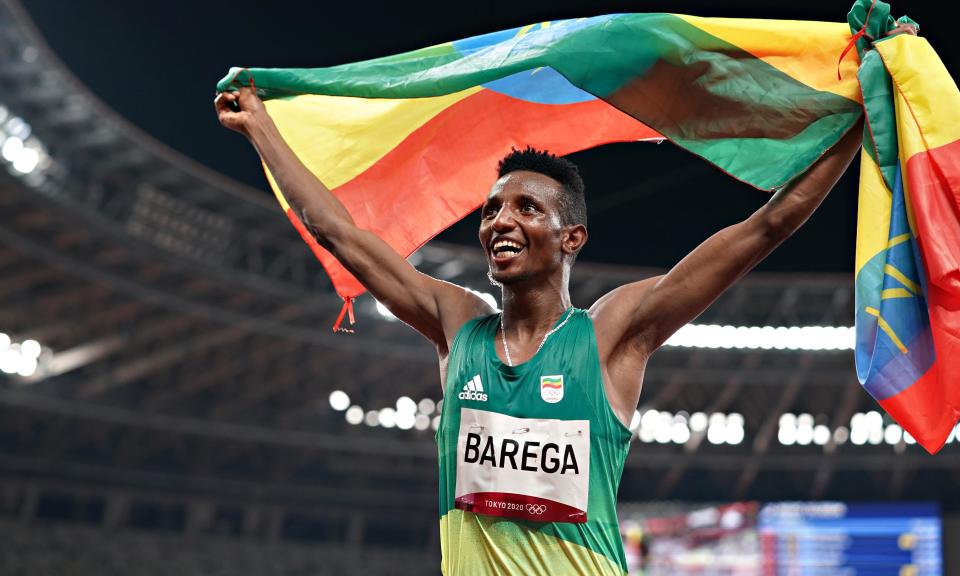Track and field brings people together, even in an empty stadium

At 8.14pm Tokyo time, as the public address burbled weirdly and a crew of lycra-wrapped athletes, male and female, collapsed together in a narrow corner of the Tokyo Olympic stadium, Marvin Schlegel, a 23-year-old German runner, leapt up on to a concrete walkway above the running track and began to roar into the empty space.
Fists clenched, neck muscles fanned, Schlegel continued to roar, a kind of wild-man victory bark. Ten minutes earlier he had run the anchor leg in Germany’s mixed 4x400 relay team. His quartet, two women and two men, had just qualified for Saturday’s Olympic final by the finest of margins.
He kept on roaring, fists pumping, pomp-rock style, and it was good, and fun and entirely uplifting because this felt like life. Blond, frightening, endorphin-crazed life. But life all the same inside this giant lighted bowl, host to 68,000 empty seats, and a monument on the opening day of the Tokyo 2020 athletics programme to sport in the time of plague.
It would be unkind to describe the Olympic events to this point as a worthy starter before the main dish. But it would also be correct. The summer Games would be a far lesser thing with its doomed Euro-aristo pastimes: the shooting, the splashing about, the homo-equine ballet. But it couldn’t exist at all without track and field.
Related: Barega wins first Tokyo athletics gold on opening night of tears and drama
The real allure of these events is their universality. Athletics is the best part of the Olympics because it is in outline entirely fair and egalitarian, the core of that old sporting ideal. You don’t need a boat or a horse. The most that’s required is an orb to toss or a bar to leap over. All you really need is legs and will.
This is a stage that everyone can share. Including, on Friday night, a wondrously happy German relay team, featuring a 23-year-old whose life’s ambition, according to an old Instagram post from the time before they cancelled the people, was always to compete at these Games.
For the people of Tokyo there will relief at reaching the second half of their Olympics, and no doubt sadness at seeing this vast global beano take place without an invite, just a bill for the works.
The Olympic stadium is the centre of every Games and always its most costly part. This is one is a $1.4bn refurb of the 1964 Olympic hub, just north of the Tokyo bay area.
Even as the day’s programme began it was mournfully huge and mournfully empty. The beige and brown seats at least have a speckled effect in the distant upper tiers, giving an imitation of life. Otherwise it is surely the starkest of all the world’s many empty shared spaces right now, a place constructed to stage the greatest show on earth (start time: now) which is simply a vast man-made absence.
The stadium was rebuilt by the renowned Japanese architect Kengo Kuma, whose Wikipedia page states that his goal is to recover the tradition of Japanese buildings and to reinterpret these for the 21st century. Kuma also built the Dundee V&A, so Dundee’s ancient traditions are, similarly, in good hands.
The Tokyo 2020 blurb suggests the stadium is supposed to feel “connected to its surrounds”, an organic part of this dense, green city. But it didn’t feel connected to much on Olympics day seven, more a place of temporary communion, athletes, officials and volunteers scuttling about in all that borrowed space trying to stage a show for the world.
As the women’s triple jump and shot putt heats kicked into gear the stadium announcer continued to burble away unheeded, something to fill the silence, along with the weird, anxiety-inducing incidental music, a rumble of bass, a sudden drum break, broken up now and then by a yell as the shot was launched.
It is easy to forget how hard this is on the athletes, how odd it is to be competing at their life’s goal, the end point of an obsession, in front of all this emptiness. Or perhaps not. Maybe it’s normal by now. It has been almost a year and a half. Hopefully not. We need this stuff. Don’t get too used to it.
Related: ‘Rainbow Olympics’: Tokyo hailed as turning point for LGBTQ+ athletes
This Olympic by-product will at least serve a useful life as Japan’s national stadium when shared mass existence is permitted again. But its presence here does highlight the frequent pointless expense of Big Sport, and the need in future for these vast projects. So many years in the making for two weeks of televised action. Time to call a halt on the cement contracts. Let’s all take a moment here.
It was hard to avoid silence as the day’s competition wound down. People: you miss them after a while. One thing this Games won’t have is that shared moment of the grand finale, the wave of feeling as the crowd rises to some feat of human ultimacy. London 2012 had its Super Saturday, crowned by Mo Farah’s gold in the 10,000 metres – and the same race ended the action on the opening day in Tokyo.
It provided a thrilling finish, Selemon Barega of Ethiopia sprinting down the final straight to take gold ahead of Joshua Cheptegei of Uganda and his countryman Jacob Kiplimo. As Barega crossed the line he started off on a victory lap, realised there wasn’t much point and went to the nearest stand of officials and coaches.
The Ugandans held their flag for the cameras, flanked by a gleeful bobbing huddle of team members. Did it feel like the Olympics? Kind of. The moment was there, but not the people, the shared moment replaced, in Tokyo, with that feeling of shouting into the void.

 Yahoo Finance
Yahoo Finance 